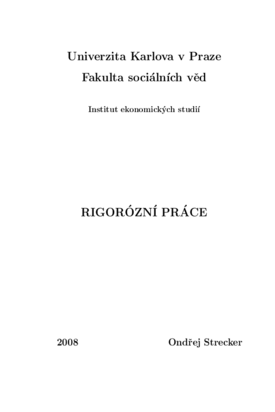Vliv inflačních diferenciálů na dynamiku HDP
Implications of inflation differentials on the dynamics of GDP
rigorózní práce (OBHÁJENO)

Zobrazit/
Trvalý odkaz
http://hdl.handle.net/20.500.11956/1802Identifikátory
SIS: 65703
Katalog UK: 990011221400106986
Kolekce
- Kvalifikační práce [19618]
Autor
Vedoucí práce
Oponent práce
Janda, Karel
Fakulta / součást
Fakulta sociálních věd
Obor
Ekonomie
Katedra / ústav / klinika
Institut ekonomických studií
Datum obhajoby
22. 10. 2008
Nakladatel
Univerzita Karlova, Fakulta sociálních vědJazyk
Čeština
Známka
Prospěl
Inflační diferenciály znamenají v prostředí měnové unie i rozdíly v reálné úrokové míře. V krátkém období tak na HDP přusobí procyklicky, jednak přímo a prostřednictvím efektu bohatství taky nepřímo. V delším období kumulující se inflační diferenciály zhoršují reálný měnový kurz a postupně tak převáží jejich anticyklický vliv. Pro dynamiku HDP z toho plyne předpoklad delších a hlubších cyklřu. Po teoretické analýze mechanismu tato práce kvantifikuje jednotliv é efekty pro případ EMU a zabývá se očekávanými změnami vlastností cyklu po zavedení Eura. GMM a Kivietovy odhady modelřu s panelovými daty většinou potvrzují statistickou signifikanci popsaných efektřu. Další výsledky ukazují pozitivní souvislost mezi absolutní velikostí inflačních diferenciálřu a rřustem amplitudy cyklřu, prodloužením jejich délky a prodloužením doby nutné k návratu do rovnováhy po poptávkovém šoku.
Inflation differentials within a monetary union translate into differentials in real interest rates. Consequently, their effect (either direct or indirect, through the wealth channel) on the GDP is pro-cyclical in the short term. In the long term, accumulated inflation differentials worsen the real exchange rate and so after some time their anti-cyclical effect will prevail. Concerning the dynamics of the GDP, longer and stronger cycles can be expected. After a theoretical description of the mentionned mechanism this paper quantifies individual effects for the EMU. It also deals with expected changes in cycles' properties after the adoption of Euro. GMM and Kiviet estimates of the panel data model generally prove the statistical significance of the considered effects. Subsequent results show positive relationship between the absolute magnitude of the inflation differentials on the one hand and the growth of the amplitude of the cycles, increase in their length and increase in time needed for the economy to return to the equilibrium after a demand shock on the other hand.
